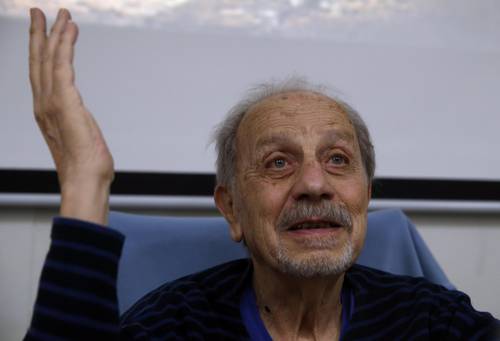Convened by public and higher education institutions in Mexico, the international colloquium will take place from April 16 to 18 in the country’s capital. History against the grain: Adolfo Gilly and the craft of historian, with which tribute is paid to that Argentine-Mexican intellectual and humanist on the eve of the first anniversary of his death, which occurred on July 4, 2023 on the threshold of 95 years of age.
The program will consist of six round tables, an opening event and a closing event, as well as a virtual conference by the Franco-Brazilian Marxist philosopher Michael Löwy, from the School of Higher Studies in Social Sciences in Paris, who cultivated an intellectual friendship with the honoree, announced yesterday the federal Ministry of Culture (SC).
The meeting will bring together around thirty national and foreign academics, researchers and specialists, including historians Felipe Ávila, director of the National Institute of Historical Studies of the Revolutions of Mexico (Inehrm), one of the convening bodies; Sinclar Thomson of New York University; Anna Ribera Carbó, and Jesús Vargas.
Likewise, to the political scientists Rhina Roux Ramírez, Olivia Gall Sonabend, Fernando Ayala Blanco, Karla Valverde Viesca and Araceli Mondragón; to the philosophers Mario Ruiz Sotelo and Diana Fuentes de Fuentes; as well as the journalist Luis Hernández Navarro and the caricaturist Rafael Barajas The Snooper, both collaborators of The Day, as was also Adolfo Gilly.
They are joined by the Latin Americanist Viviana Bravo Vargas, researcher at the Alberto Hurtado University of Chile; John Tutino, professor in the Department of History and director of the Americas Forum at Georgetown University, and social scientist Imanol Ordorika.
In addition to the Inehrm and the SC, the Autonomous Metropolitan University-Xochimilco (UAM-X), the Colegio Mexiquense (CMQ) and the Faculty of Political and Social Sciences (FCPyS) of the National Autonomous University of Mexico participate in the organization of the colloquium (UNAM).
Historian, political scientist, university professor and man committed to his ideas, Adolfo Atilio Malvagni Gilly is considered by some scholars one of the last great Latin American revolutionaries
.
He was born in Buenos Aires, Argentina, in 1928 and obtained Mexican citizenship in 1982, a country where he arrived several decades ago as a guerrilla and was imprisoned for that cause from 1966 to 1972 in the Lecumberri prison, where he wrote his paradigmatic book The revolution interrupted.
His commitment and revolutionary spirit were not limited only to the area of Latin America, but were world-class, stated Felipe Ávila in a tribute held at the last International Book Fair in the Zócalo, in which he recalled the passage of that intellectual and humanist by various mining, workers, social and revolutionary movements, among them in Bolivia, Cuba, El Salvador, Guatemala and, above all, Mexico, in addition to praising how he was not only always on the front line of battle in all the movements of resistance as just another militant, but as a lucid voice that reflected on them and wrote down their points of view.
Adolfo is, perhaps, from what I know, the only great Latin American revolutionary who not only participated in the great experiences of revolutionary struggle in Latin America from the 1940s to the present day, but was also the most lucid, profound and comprehensive mind who was able to analyze and reflect on these processes of revolutionary struggle, and did so in multiple spheres of intellectual production, from journalism, chronicles and essays to books of deeper reflection.
indicated the director of Inehrm on that occasion.
make history unwillingly
It was his great bet, according to political scientist Araceli Mondragón, to whom he directed his master’s and doctoral theses, and who was his teaching assistant at the FCPyS.
“He called ‘history against the grain’ that which has a social function, in which we somehow recognize ourselves; identity is recognized, but also always approached from a perspective of those from below, from the people, from social struggles,” explained the UAM-X professor-researcher.
The axis of his thought was to make history from a subaltern perspective, not as a form of academic and positivist knowledge, but rather history with all its rigor, but also as a vital and militant position.
The colloquium will be inaugurated on April 16 at 8:30 a.m. in the Miguel Ángel Granados Chapa auditorium of the UAM-X. It will also have as its headquarters the Academic Council Room and Alternate Room of that institution; the Fernando Benítez room, from the FCPyS of the UNAM; the Presidents room of the CMQ, and the main room of the Inehrm. The activities can be followed in person and in direct transmission through the social networks of the organizing institutions. More information on the site: inehrm.gob.mx.
